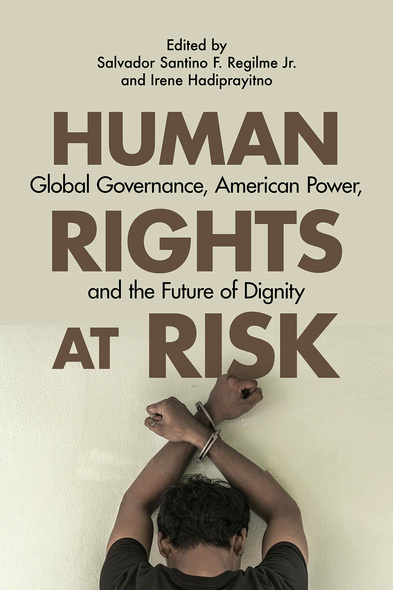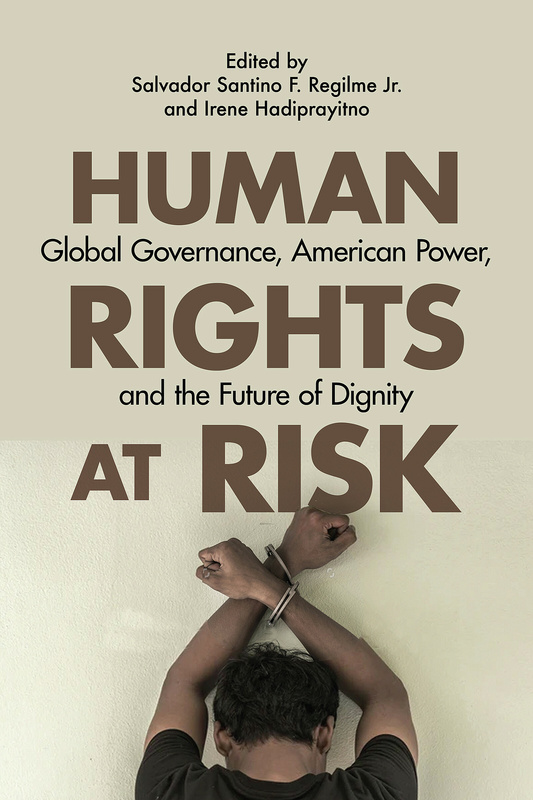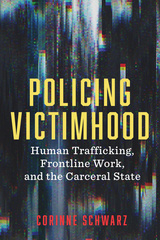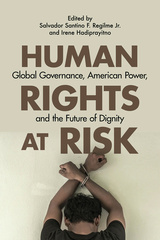
214 pages, 6 1/8 x 9 1/4
5 b&w images
Paperback
Release Date:17 Jun 2022
ISBN:9781978828421
Human Rights at Risk
Global Governance, American Power, and the Future of Dignity
Edited by Salvador Santino F. Regilme and Irene Hadiprayitno
Rutgers University Press
Human Rights at Risk brings together social scientists, legal scholars, and humanities scholars to analyze the policy challenges of human rights protection in the twenty-first century. The volume is organized based on three overarching themes that highlight the challenges and risks in international human rights: international institutions and global governance of human rights; thematic blind spots in human rights protection; and the human rights challenges of the United States as a global and domestic actor amidst the contemporary global shifts to authoritarianism and illiberal populism. One of the very few books that offer new perspectives that envision the future of transnational human rights norms and human dignity from a multidisciplinary perspective, Human Rights at Risk comprehensively examines the causes and consequences of the challenges faced by international human rights. Scholars, students, and policy practitioners who are interested in the challenges and reform prospects of the international human rights regime, United States foreign policy, and international institutions will find this multidisciplinary volume an invaluable guide to the state of global politics in the twenty-first century.
Human Rights at Risk provides a much-needed, thoughtful, and forward-looking assessment of human rights at a critical moment. The authors are realistic about challenges from super powers and authoritarians alike. Yet they also see hope in grassroots movements far from power centers in Geneva and New York that use human rights to work for transformational change.
A tour de force of the challenges and contradictions facing the current human rights movement. By problematizing the universal acceptance of individual human rights norms, the authors have allowed for a major leap in our understanding of global abuses. The diversity of author backgrounds, disciplines, and approaches adds to the validity of their argument and should be the gold standard for all human rights and international relations scholarship.
Human Rights at Risk is also a set of essays on humanity at risk. Contributors demonstrate both how the application of human rights, as well as their repression, are central to the state we are in. Whether providing theoretical or empirical accounts, there are gems in this volume that should grab the attention of international lawyers.
This volume highlights how the concept of human rights is broadened, how this issue is recognized across the world, but also how vulnerable the regime is to threats from populism and US isolationism. By addressing human rights from the different viewpoints of international institutions, states, and victims, it provides a unique compelling, informative, and though-provoking resource for readers interested in international relations and current affairs.
Human Rights at Risk provides a much-needed, thoughtful, and forward-looking assessment of human rights at a critical moment. The authors are realistic about challenges from super powers and authoritarians alike. Yet they also see hope in grassroots movements far from power centers in Geneva and New York that use human rights to work for transformational change.
A tour de force of the challenges and contradictions facing the current human rights movement. By problematizing the universal acceptance of individual human rights norms, the authors have allowed for a major leap in our understanding of global abuses. The diversity of author backgrounds, disciplines, and approaches adds to the validity of their argument and should be the gold standard for all human rights and international relations scholarship.
Human Rights at Risk is also a set of essays on humanity at risk. Contributors demonstrate both how the application of human rights, as well as their repression, are central to the state we are in. Whether providing theoretical or empirical accounts, there are gems in this volume that should grab the attention of international lawyers.
This volume highlights how the concept of human rights is broadened, how this issue is recognized across the world, but also how vulnerable the regime is to threats from populism and US isolationism. By addressing human rights from the different viewpoints of international institutions, states, and victims, it provides a unique compelling, informative, and though-provoking resource for readers interested in international relations and current affairs.
SALVADOR SANTINO F. REGILME JR. is a tenured university lecturer in international relations at Leiden University in the Netherlands. He is the author of Aid Imperium: United States Foreign Policy and Human Rights in Post-Cold War Southeast Asia (2021) and the co-editor of American Hegemony and the Rise of Emerging Powers (2018).
IRENE HADIPRAYITNO teaches at the Leiden Institute of Area Studies at Leiden University in the Netherlands.
IRENE HADIPRAYITNO teaches at the Leiden Institute of Area Studies at Leiden University in the Netherlands.
Chapter 1: The Global Human Rights Regime: Risks and Contestations
Chapter 2: Transparency, Accountability, and Legitimacy within the UN Universal Periodic Review
Chapter 3: After Obama: The African Group at the UN Human Rights Council
Chapter 4: Consensus and Human Rights Politics: The Case of ASEAN Intergovernmental Commission on Human Rights
Chapter 5: Skewed Vision: Human Rights in War through the Eyes in Peace
Chapter 6: Who Are the Victims of Crimes Against Cultural Heritage?
Chapter 7: Challenging the Legal Boundaries of Genocide: The War on Drugs in the Philippines
Chapter 8: Human Rights at Risk in the Era of Trump and American Decline
Chapter 9: The Tyranny of Exceptionalism: How the United States Rejects Universal Human Rights
Chapter 10: Natural Law and the Future of Human Rights
Chapter 11: Yesterday, Today, and Tomorrow: Thoughts on Global Human Rights in the 21st Century
Chapter 12: Risks and Emancipatory Rights
Acknowledgments
Notes on Contributors
Index
Chapter 2: Transparency, Accountability, and Legitimacy within the UN Universal Periodic Review
Chapter 3: After Obama: The African Group at the UN Human Rights Council
Chapter 4: Consensus and Human Rights Politics: The Case of ASEAN Intergovernmental Commission on Human Rights
Chapter 5: Skewed Vision: Human Rights in War through the Eyes in Peace
Chapter 6: Who Are the Victims of Crimes Against Cultural Heritage?
Chapter 7: Challenging the Legal Boundaries of Genocide: The War on Drugs in the Philippines
Chapter 8: Human Rights at Risk in the Era of Trump and American Decline
Chapter 9: The Tyranny of Exceptionalism: How the United States Rejects Universal Human Rights
Chapter 10: Natural Law and the Future of Human Rights
Chapter 11: Yesterday, Today, and Tomorrow: Thoughts on Global Human Rights in the 21st Century
Chapter 12: Risks and Emancipatory Rights
Acknowledgments
Notes on Contributors
Index







